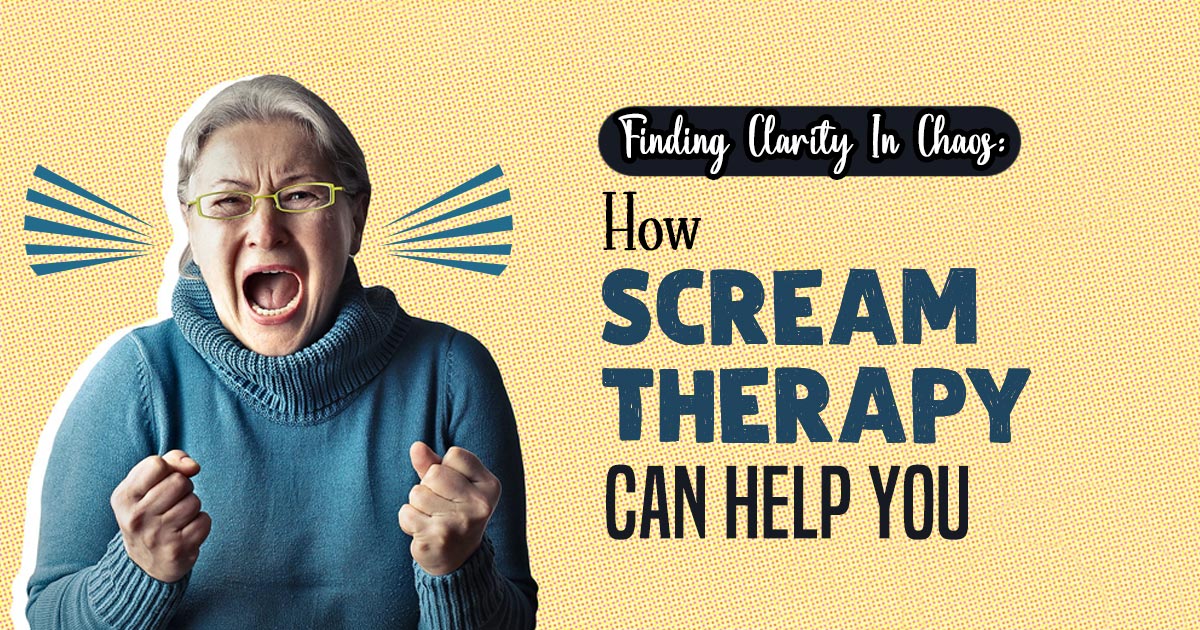In a world where stress and anxiety are increasingly prevalent, people are constantly seeking innovative ways to improve their mental and emotional well-being. Scream therapy, also known as primal scream therapy, is one such unconventional approach that has gained attention for its potential therapeutic benefits.
Scream therapy finds its roots in the humanistic psychology movement of the 1960s and 1970s. Arthur Janov, an American psychotherapist, is often credited with popularizing the concept. His book, “The Primal Scream,” published in 1970, introduced the idea that releasing repressed emotions, particularly through screaming, could lead to psychological healing.
This therapy suggests that unresolved childhood traumas and emotional suppression can lead to various psychological and physical issues and that by releasing these pent-up emotions, individuals can find relief and personal growth.
Principles Of Scream Therapy
Scream therapy is based on several core principles:
1. Emotional Release:
The fundamental principle of scream therapy is that repressed emotions, often stemming from early life experiences, can lead to psychological and physical ailments. The therapy encourages individuals to release these emotions, often through screaming or other vocal expressions.
2. Regression:
Scream therapy often involves regressing to earlier stages of life, where these repressed emotions originated. By revisiting past traumas and expressing the associated emotions, individuals can achieve catharsis and resolve emotional conflicts.
3. Catharsis And Healing:
The ultimate goal of scream therapy is to provide a cathartic release of emotions, leading to emotional healing and personal growth. By confronting and releasing deeply buried emotions, individuals can potentially experience relief and emotional well-being.
Methods Of Scream Therapy
Scream therapy employs various methods to facilitate emotional release:
1. Vocal Expression:
Participants are encouraged to scream, shout, or vocalize their pent-up emotions. This can be done individually or in group settings, where individuals support one another through the process.
2. Role Of The Therapist:
A trained therapist plays a crucial role in guiding the individual through the therapy sessions. they create a safe environment for emotional expression and help individuals explore the root causes of their emotional distress.
3. Breathing Techniques:
Controlled breathing exercises are often incorporated to facilitate the release of tension and emotions. Deep breaths followed by intense vocalization can enhance the therapeutic process.
Effectiveness And Controversy Of Scream Therapy
The effectiveness of scream therapy is a topic of ongoing debate within the field of psychology. Some proponents argue that it can provide significant benefits, while skeptics question its scientific validity and potential risks.
Supporters of scream therapy claim the following benefits:
1. Emotional Release:
Participants often report feeling a sense of relief and release after engaging in scream therapy sessions. This emotional catharsis can lead to decreased stress and anxiety.
2. Increased Self-Awareness:
Scream therapy encourages individuals to confront their past traumas and emotions, leading to increased self-awareness and personal growth.
3. Improved Mental Health:
Some proponents argue that scream therapy can help individuals manage and overcome issues like anxiety, depression, and post-traumatic stress disorder (PTSD).
On the other hand, critics argue that scream therapy has several limitations and potential risks:
1. Lack Of Scientific Validation:
Many in the scientific and psychological communities argue that there is insufficient empirical evidence to support the efficacy of scream therapy as a standalone therapeutic approach.
2. Risk Of Re-traumatization:
For individuals with severe trauma, scream therapy can potentially re-traumatize them, especially if not conducted by a trained and ethical therapist.
3. Ethical Concerns:
Some critics raise ethical concerns regarding the therapist’s role and the potential for exploitation of vulnerable individuals.
Scream therapy, with its roots in humanistic psychology, offers a unique approach to emotional release and healing. While some individuals report benefits such as emotional catharsis and increased self-awareness, its efficacy remains a subject of debate within the scientific community.
The decision to explore scream therapy should be made cautiously, under the guidance of a trained therapist, with full consideration of its potential risks and limitations. Further research is needed to better understand its therapeutic potential in the context of mental health and emotional well-being.






